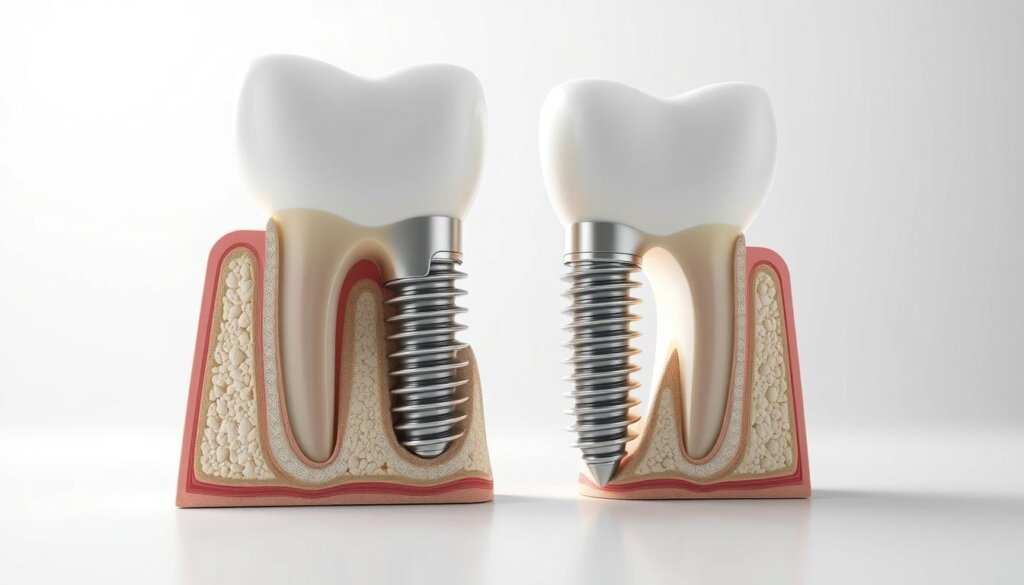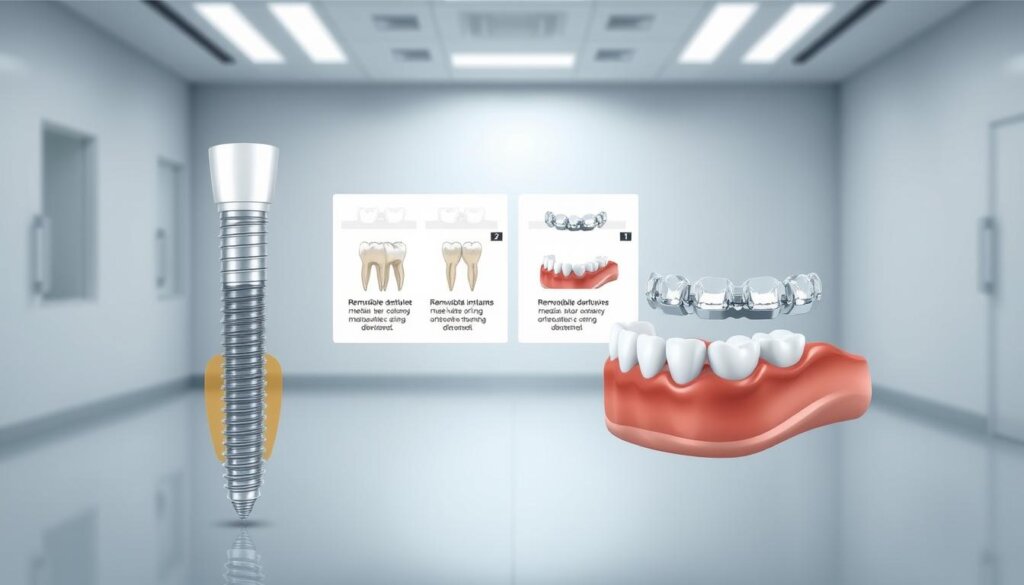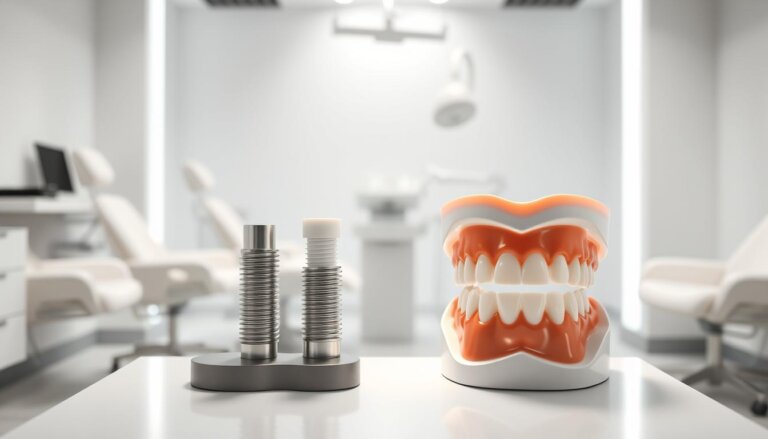What are Dental Implants?
Every year, millions of people in the U.S. lose their teeth because of decay, gum disease, or injury. Now, there’s a high-tech way to replace missing teeth called dental implants. They’re not just for looks; dental implants act like real teeth in how they work and look.
Dental implants are the best choice in prosthetic dentistry. They’re made of titanium posts that go into the jawbone, taking the place of lost tooth roots. These posts bond with your bone, creating a strong base for false teeth like crowns or dentures.
Specialists in dental implants put these in your mouth. They need to be very careful and know a lot about teeth and how they connect to your bones. Putting in implants has several steps, including planning, surgery, and healing, which can take months.
Key Takeaways
- Dental implants offer a full solution for lost teeth, more than just making your smile look better.
- Implants and the jawbone join together, giving a solid base for false teeth.
- Titanium, used in implants, works well with the human body because it can bond with bone.
- Experts have to put in dental implants with care and skill.
- Getting dental implants can bring back the strong and working teeth you’ve had, improving your life.
Overview of Dental Implants
Getting dental implants is a big step towards getting back a great smile. These implants have changed dentistry for the better. They bring back your smile, improve how your teeth work, and help keep your mouth healthy.
Definition of Dental Implants
Dental implants are small but strong devices, usually made of titanium, that fit well with our bodies. They are put into the jawbone to act as new tooth roots. This bond with the bone stops bone loss that can happen when teeth are gone.
Brief History of Dental Implants
The story of dental implants shows how far medical science has come. It started in the 1950s with a big discovery by Per-Ingvar Brånemark, a doctor from Sweden. Now, implants are better and available to more people, making life better for those who get them.
Before getting dental implants, it’s key to talk to a dentist. They will see if you’re a good fit and plan the treatment. This ensures you get the best results for your dental health.
Types of Dental Implants
It’s essential to know about different dental implants to choose wisely. This decision affects both the method of implantation and the patient’s specific needs. There are mainly two types: endosteal and subperiosteal implants. They meet various needs and adapt to different bone situations.
Endosteal Implants
Endosteal implants are the most used in dental implantology. They go directly into the jawbone, acting as a new tooth root. Their success depends on osseointegration—this is when the bone and implant become one. Made of titanium, they’re stable and last long. They suit those with a strong jawbone well.
- Primarily used in the dental implant procedure
- Requires good jawbone density to support the implant
- High stability through osseointegration
Subperiosteal Implants
Subperiosteal implants sit on the jawbone under the gum. They’re for patients lacking enough jawbone who avoid bone rebuilding. A metal frame is placed under the gum. It fixes to the jawbone as the gum heals. Subperiosteal implants are an alternative when endosteal ones won’t work.
- Suitable for patients with insufficient jawbone density
- No bone grafting necessary
- Faster recovery time compared to bone augmentation procedures
Choosing between implant types depends on bone structure and dental needs. Dental implants cost also varies between them.
Successful dental implants rely on the proper type and expert work. Advances in medical tech offer more options for different dental issues. This brings hope and better life quality to those needing implants.
Benefits of Dental Implants
Dental implants are a big step forward in aesthetic restorative dentistry. They offer benefits that are both functional and look good. When looking at dental implants vs. dentures, implants win by offering a stable and long-lasting solution. Let’s dive into the major benefits of dental implants, including how well they work, how they look, and how long they last.
Improved Functionality
Dental implants are awesome for bringing back your ability to chew properly. They don’t slip like dentures can because they’re firmly attached to your jawbone. This secure fit lets you enjoy a wide variety of foods, improving your health and happiness. No more avoiding hard or sticky foods.
Aesthetic Appeal
The beauty of dental implants in aesthetic restorative dentistry is huge. They’re made to look and feel like your real teeth, fitting in perfectly with the rest of your smile. This helps boost your confidence, especially if you’re self-conscious about how you look after losing a tooth.
Longevity and Durability
Dental implants last longer than other tooth replacement options like dentures and bridges. With the right care, they can last a lifetime. They’re also great for your bone health, preventing the bone loss that often happens with tooth loss. This helps keep your face looking youthful, avoiding the “aged” look linked to dentures.
| Feature | Dental Implants | Dentures |
|---|---|---|
| Stability | High (osseointegrated) | Low (can slip or slide) |
| Appearance | Natural | Less natural |
| Longevity | Lifetime with care | 5-8 years |
| Effect on Eating | No restrictions | Potential Difficulty with hard/sticky foods |
| Impact on Oral Health | Prevents bone loss | May accelerate bone loss |
Candidates for Dental Implants
Finding out if someone is right for dental implant surgery is very important. It’s the first step to getting a better smile. A person must go through some checks during an dental implant consultation. These checks help make sure the implants will work well and last a long time.
Talking to dental implant specialists helps people learn if their teeth and bones are fit for implants. It’s key to check if someone’s mouth is ready for surgery. Here, we talk about who makes a good candidate and what could stop someone from getting implants.
| Ideal Candidates | Factors Affecting Eligibility |
|---|---|
| Adults with complete jawbone growth | Overall health influencing bone healing |
| Individuals with sufficient bone density | Bone structure’s ability to support implants |
| Those free of health conditions impeding healing | Commitment to necessary care and maintenance |
| Non-smokers or individuals who can quit smoking | Long-term oral hygiene practices |
A full dental implant consultation is a must for those thinking about implants. During this time, dental implant specialists will look at different factors. They check if a person is a good fit for dental implant surgery. This careful checking helps make sure that the implant will be a success.
The Dental Implant Procedure
Getting dental implants involves many detailed steps. Each step is important for the implants to last and work well. To know what happens during dental implant surgery, we need to look closely at each part of the process.
Initial Consultation
The journey starts with an initial check-up. At this time, a dental expert checks your mouth to see if dental implants are right for you. They might take X-rays or 3D pictures to look at your jawbone. They also check your medical history. This helps make sure everything will go smoothly. If your jawbone isn’t thick enough for implants, they might talk about bone grafting.
Implant Placement Surgery
After a thorough plan is made, the surgery for placing the implant happens. This is when the implant goes into your jawbone. They use local anesthesia, so you won’t feel pain. This step starts the process of your jawbone and implant bonding together. This bond is the foundation for your new teeth.
Healing Process
The healing phase is key. It lets the implant and jawbone bond completely. This part of the process can take months. During this time, you might get temporary crowns. These help you look and feel normal.
After healing, they check to make sure the implant and bone are fully connected. Then, it’s time for the final steps, like adding the abutment and fake teeth. Understanding every phase helps patients and doctors have the same expectations. This leads to better results and happier patients.
Costs Associated with Dental Implants
Learning about the money involved in getting dental implants is super important for those thinking about fixing tooth loss this way. The dental implants cost can change due to different factors. So, it’s key for patients to check out all the payment plans for dental implants and what insurance might cover.
Factors Influencing Cost
- Type and number of dental implants needed
- Extra procedures like bone grafting
- Where you live and the going rates there
Insurance Coverage Options
Insurance plans really differ from one provider to another. Some might help pay for part of your dental implants. It’s smart for patients to talk to their insurance to get the details on coverage. Plus, chatting about payment plans for dental implants with experts can help find good ways to afford it.
| Insurance Provider | Coverage Offered | Notes |
|---|---|---|
| Provider A | Partial Coverage | Covers 50% of implant surgery |
| Provider B | Partial Coverage | Includes cost of the crown |
| Provider C | No Coverage | Offers alternative financing options |
Aftercare and Maintenance
It’s vital to keep dental implants in top shape. This means dental implant aftercare is a must. You should practice good oral hygiene for implants and visit the dentist regularly. Going to the dentist often helps take care of implants and keeps your mouth healthy.
For your implants, you need to follow certain Oral Hygiene Practices. This includes using soft toothbrushes and special brushes to clean between teeth. Also, mouthwash helps keep the area around the implant clean and free from infection.
Regular Dental Visits are crucial to stop any problems before they start. Dentists can check on your implants to make sure they’re secure. They also clean around the implants to keep the gums healthy and prevent disease.
| Aspect | Frequency | Benefits |
|---|---|---|
| Professional Cleaning | Every 6 Months | Prevents plaque build-up, reduces risk of peri-implantitis |
| Regular Checkups | Every 6-12 Months | Early detection of issues, adjustment of care regimen |
| Oral Hygiene Reevaluation | Annually | Assessment of personal oral care techniques, updates on new practices |
By doing proper dental implant aftercare and seeing your dentist often, your implants can last for many years. This includes good oral hygiene for implants and regular dental checkups.
Risks and Complications
Dental implant surgery is great for replacing missing teeth, but it comes with certain risks. It’s very important for patients and dental experts to know these risks. This helps in preparing and preventing them.
Dental implant surgery risks are usually low but can include infection, damage to nearby teeth, nerve injury, and sinus problems.
To avoid problems with dental implants, picking a skilled dental expert is key. Dental implant specialists have the right know-how and tools to keep the surgery safe. To lower risks:
- Pick certified and experienced dental implant specialists.
- Strictly follow aftercare tips.
- Keep your mouth clean to avoid infections.
Working to prevent dental implant complications not only boosts the success of the surgery. It also makes recovery better for the patient.
It’s important for patients to talk about any worries with their dentists. Understanding what to expect and how to get ready is crucial. This kind of open talk increases trust and helps ensure the treatment works well.
Comparison to Other Tooth Replacement Options
Choosing between dental implants and dentures, along with dental bridges and other options, means looking at each one’s benefits and downsides. Dental implants bring strong benefits in stability, use, and dental health.
Dental bridges, while popular, mean altering nearby healthy teeth to fit the bridge. This may cause more dental problems later. Dental implants don’t impact surrounding teeth, making them a better choice for oral health.
Dentures can be cheaper and less invasive than implants, but they often need adjustments and can be unstable. This can impact chewing and speaking. In contrast, dental implants are securely placed in the jaw, acting like a real tooth’s root. They offer a lasting solution that doesn’t need tweaking.
In comparison, implants are often preferred by both patients and dentists. They’re not just good-looking but also function well and last long. Yet, the right choice depends on personal health, needs, and how much one can spend. Talking it over in detail with a dentist is key.
For those looking at alternative tooth replacement options, it’s important to compare the good and bad sides of implants versus dentures and bridges. This helps in making a choice that’s good for your health and fits your way of living.
Life with Dental Implants
Dental implants are a game-changer for improving dental health and well-being. Learning about the life quality dental implants offer is crucial. They don’t just help you chew better but also boost your lifestyle in many ways. These benefits touch many parts of life, like eating, talking, confidence, and social life.
Dental implants bring back the full use of natural teeth, meaning you can eat anything you want. This big change is good for both your body and mind because you can enjoy your favorite meals without stress. Also, dental implants help you speak more clearly. This is a big help compared to other dental options.
Living with dental implants means little change compared to other dental choices. Implants blend into your life smoothly, making you feel natural. This boosts your self-esteem in a big way. So, dental implants are often the best pick for lasting dental health.
Eating and Speaking
The best part about dental implants is they improve eating and talking. They work like real teeth, letting you bite and eat all kinds of food. This means better nutrition and a happier life with fewer food limits.
Lifestyle Adjustments
Switching to implants is easy, and people get used to them fast. Unlike dentures, which can slip or hurt, implants stay put. They are a dependable choice that doesn’t need a lot of fixes.
To sum up, choosing dental implants can make life better, offering ease and confidence in daily life. The quality of life with dental implants is much better, thanks to their reliable function and easy fit into daily routines.
Technological Advancements in Implants
The field of dental implants is growing fast thanks to advanced dental implant technology. This progress is making implants work better and look nicer. Plus, they’re more likely to succeed, thanks to new ways of placing them accurately.
One big step forward is using 3D imaging technology. This change has made placing dental implants much more accurate. This brings several advantages:
- Better view of where the implant goes
- More precise implant placement, reducing risks
- Faster procedures and happier patients
Along with 3D tech, mini dental implants are another big advance. They’re smaller and less invasive. This makes them a great choice for people who don’t want major surgery:
- Perfect for spots with not much bone
- Less pain and quicker recovery
- Affordable way to replace teeth
Both 3D imaging and mini dental implants stand out in advanced dental implant technology. They ensure patients get better results. Also, they allow for treatments to be more tailored and flexible than ever before.
Frequently Asked Questions
Dental implants are a top choice for fixing missing teeth. People often have questions about their safety, how well they work, and how long they last. We’ll look into how long dental implant longevity is, who can get candidacy for dental implants, and what to do if a dental implant fails.
How long do dental implants last?
Dental implants are known for being very durable. With the right care, they can last forever. The key to dental implant longevity is taking good care of your mouth and seeing your dentist regularly. They have high success rates, making them a trusted choice for replacing teeth.
Can anyone get dental implants?
Who can get dental implants mainly depends on the person’s health and if they have enough bone for the implant. Most adults who are healthy can probably get them. But, seeing a dental expert first is important to see if implants are right for you.
What if a dental implant fails?
Even though it’s rare, sometimes dental implants don’t work out. But there are dental implant failure solutions ready to fix these issues. First, the dentist will take out the bad implant and let the area heal. Then, they might try putting in a new one, making sure to adjust their method based on what went wrong before.
Finding a Qualified Dentist
Finding the right dentist for dental implants means looking for someone who knows a lot about the process. They should have a good history of happy patients. It’s important to choose a dental implant expert carefully. They need to understand oral anatomy and how to use the latest implant tech. Make sure to thoroughly check the dentist’s background to find someone trustworthy for your oral health.
Key Qualifications to Look For
Look for a dentist with the right education, certifications, and ongoing training in implant dentistry. A good specialist will have taken extra programs and be certified by well-known groups. This shows they are serious about learning the best implant methods. Besides their degrees, look at how much hands-on experience they have. A dentist’s success stories can tell you a lot about their skills and the smiles they’ve helped create.
Importance of Experience
Experience is crucial for dental implant success. Dentists who’ve been doing implants for a long time know how to handle challenges well. Don’t hesitate to ask how many implants they’ve done and look for feedback from their past patients. A good history of successful implants shows they can do the procedure right. Plus, they know how to care for you afterward. In short, a seasoned dentist is key to a worry-free implant process and lasting oral health.







